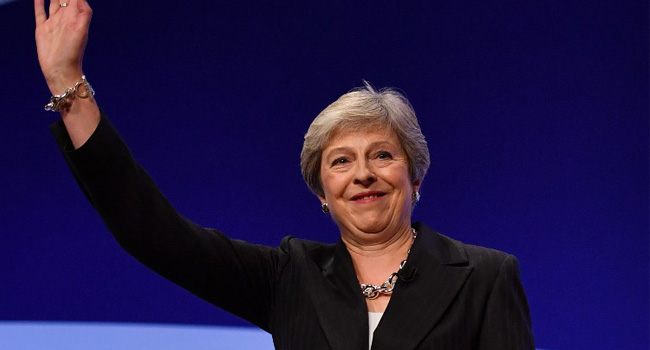
Ben STANSALL / AFP
Prime Minister Theresa May appealed for her bickering party on Wednesday to unite at the “toughest phase” of negotiations aimed at averting economic chaos once Britain leaves the European Union in six months.
May danced a little jig to the strains of ABBA’s “Dancing Queen” as she approached the podium for her address at the ruling Conservative Party’s annual gathering.
It was a self-deprecating dig at the ribbing she got for her robotic dancing during a visit to Africa.
It also appeared aimed at showing the prime minister to be at ease and in charge at a momentous moment for Britain.
“We are entering the toughest phase of the negotiations,” May said, drawing firm applause.
“If we stick together and hold our nerve, I know we can get a deal that delivers for Britain.”
It was one of the biggest speeches of her political career. May is buffeted from all directions, with European officials anxious that the two sides are heading for a messy divorce.
Following warnings of the potentially calamitous impact a no-deal Brexit would have on trade, France’s budget minister admitted on Tuesday that Paris was preparing “for the worst”.
But May’s immediate concern was to regain the confidence of her party and present a united front in crucial negotiations with Brussels over the next two weeks.
She mixed optimism with a show of determination in a sweeping hour-long address.
“I passionately believe that our best days lie ahead of us and that our future is full of promise,” May said.
‘Come together’
Yet May currently has a mini-revolt on her hands from some members of her party as well as facing pressure from EU officials determined to stick to their guns.
Eurosceptic MPs led by former foreign minister Boris Johnson have held a string of packed fringe meetings to argue against May’s proposal for Britain to follow EU trade rules on goods after it leaves.
Johnson and others say such a close partnership would ignore the wishes of voters who backed the Brexit referendum in 2016. They want a clean break.
EU officials argue that May is asking for too much: “cherry-picking” the benefits of a union while still leaving the bloc.
May insists her ideas offer the only way to protect jobs and trade while also avoiding physical checks on Britain’s land border with EU member Ireland.
“Even if we do not all agree on every part of this proposal, we need to come together,” May said.
The prime minister is also preparing new proposals on a plan B to keep the frontier open if and until a new trade deal could be agreed with the EU.
Speculation is growing that London may accept some checks on goods passing between British-ruled Northern Ireland and the rest of Britain.
These are meant to avoid such checks on the border between Northern Ireland and Ireland itself — something all sides want to avoid.
But Northern Ireland’s Democratic Unionist Party (DUP) on Tuesday appeared to reject the idea outright — a prospect that could kill any arrangement May reaches with the EU.
May’s party depends on the DUP for its majority in the House of Commons. MPs must approve any final Brexit deal.
But May also has her share of heavyweight supporters both inside the party and Brussels who think any alternative to her plan would make matters far worse.
May has surprised observers by surviving this far and many delegates at the conference — whatever their feelings on Brexit — are wary of a change at the top now.
“We underestimated Mrs. May’s resilience,” a senior European official told AFP.
AFP







